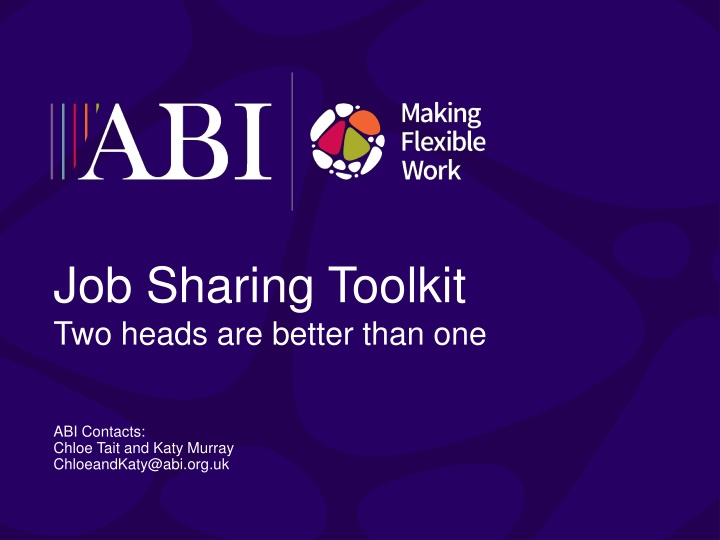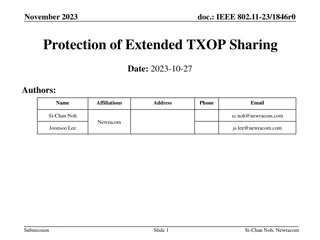Enhancing Diversity and Productivity Through Job Sharing in the Insurance Sector
Advertising roles as open to flexible working, including job sharing, is crucial for attracting diverse talent and reducing the gender seniority gap in the insurance industry. Job sharing benefits both employees and employers, increasing productivity and well-being. Evidence suggests that job sharing can help in career progression, particularly for women who often opt for part-time work due to a lack of job sharing opportunities. Embracing job sharing can lead to a more innovative and profitable organization with a more diverse leadership team.
Download Presentation

Please find below an Image/Link to download the presentation.
The content on the website is provided AS IS for your information and personal use only. It may not be sold, licensed, or shared on other websites without obtaining consent from the author.If you encounter any issues during the download, it is possible that the publisher has removed the file from their server.
You are allowed to download the files provided on this website for personal or commercial use, subject to the condition that they are used lawfully. All files are the property of their respective owners.
The content on the website is provided AS IS for your information and personal use only. It may not be sold, licensed, or shared on other websites without obtaining consent from the author.
E N D
Presentation Transcript
Job Sharing Toolkit Two heads are better than one ABI Contacts: Chloe Tait and Katy Murray ChloeandKaty@abi.org.uk
Overview Advertising the majority of roles as open to flexible working including job sharing is one of the three Making Flexible Work Charter commitments. Increasing flexible working, particularly job sharing, will help employers attract and retain the best and most diverse talent and our research shows that, over time, it will reduce the gender seniority gap. Job sharing is one of the least common forms of flexible working in the insurance and long-term savings sector and this guide is designed to: 1. 2. 3. Share evidence about how job sharing can increase diversity and productivity Set out the benefits and bust myths Signpost HR leaders and hiring managers to websites, blogs and guides that can support them to make job sharing work for their organisation or team Support individuals who are considering job sharing by sharing links to websites that provide information on best practice, practical tips and guidance on how to find a job share partner. 4.
How job sharing can increase diversity and productivity: Anyone can benefit from the opportunity to job share including those who want a portfolio career, those who might otherwise retire, or individuals who want to study part-time. People job share for different reasons and job sharing has the potential to increase diversity by unlocking career opportunities for a wide variety of individuals. There s detailed evidence to show that job sharing benefits employers as much as it benefits employees. Civil Service research shows that people who job share have higher levels of wellbeing compared with people that work full-time or part-time. Job Share teams maintain high energy levels throughout the week and research from The Job Share Project* shows that they can be up to 30% more productive compared with full time workers. (*see page 43) Research from McKinsey , the Boston Consulting Group and numerous other sources shows that organisations with more diverse leadership teams are more innovative and profitable and offering flexible working and job sharing is proven to increase diversity. Research from the Government Equalities Office shows that firms that include job sharing as part of their flexible working policy will have access to a wider talent pool and increase their ability to retain talent too.
How job sharing can reduce the gender seniority gap: ABI data shows that women make up just 24% of those at Executive Level in the insurance and long-term savings sector and that over the last three years there has been little progress at this level. The Gender Seniority Gap Report published by the ABI in 2018 recommended that our sector increase job sharing as a way of addressing this issue. The report showed that increasing job sharing is likely to be the single most effective way of reducing the gender seniority gap. Evidence shows that when employees work part-time their career stagnates, because most senior roles can t be covered on a part-time basis and there are few opportunities to progress. Of those that currently work part-time in our sector, 87% are women. Many women choose to work part-time after having children, but that s often because the opportunity to job share is not there and most firms have not put processes in place to support job sharers or their line managers. Job sharing allows employees who need or want to work part-time to continue progressing in their career the same way as a full-time worker. Most jobs can be done as a job share and it s a form of flexible working that offers huge benefits for employers and employees.
Top 10 benefits of job sharing: 1. Job sharing increases diversity, gives employers access to a wider talent pool and improves talent retention. 2. Two heads are better than one research shows that people who job share are more productive, innovative and have higher levels of wellbeing compared with those who work full or part-time. 3. Job sharing increases resiliency and continuity when one job share partner is on annual leave, or is unable to work, the role can still be covered to an extent by the other job share partner. This is great for clients and colleagues. 4. Job share partners have two sets of skills and experience and two networks - this means they can learn from each other and cover a wider range of responsibilities. 5. If job share partners work six days between them (three days a week each) then they can take on six days' worth of responsibilities and deliver more than one person working five days a week. No time is wasted. 6. Job share partners innovate and problem solve together, and this reduces management time. As The Job Share Pair say: As one another s workload solely depends on what the other has achieved, the majority of job share couples are self-managing - relying on one another s output for the benefit of each other and the organisation. 7. Job share partnerships can be structured in different ways, but they often work three days a week each with a cross over each Wednesday. This means that they have the unique ability to be in two places at once. 8. People that job share are ambitious they need or want to work part-time hours and they want to progress in their careers. Job sharing can unlock career opportunities for a wide range of people and job sharers put 5 days' work of work energy into the 3 days that they work. 9. Most roles can be done as a job share. Job share partners share the load in high pressured roles and people that job share have higher levels of wellbeing compared with both full-time and part-time workers. 10. A wide variety of people can job share and job share partners can be very different if you can work in a team then you can job share and having different strengths to your job share partner is a good thing.
Top 10 tips from people that job share: 1. Building a relationship based on trust and setting out your vision for how you want to work together and how you will deliver for your organisation. 2. There are lots of different ways to structure a job share partnership and often it s about what works for the individuals and the organisation. You can find out more in this guide. 3. Developing shared objectives and individual development plans. You may be sharing a role but you re still two individual people with different personal development needs and interests. 4. Thinking through how you will work together on strategy development. 5. Thinking through how you will take a shared approach to managing a team and how you will set expectations with that team and with wider colleagues and external stakeholders (particularly if they are new to job sharing). 6. Perfecting and refining your handover this is one of the most important shared documents you will own as a job share partnership. 7. IT and admin: creating a shared inbox, joint signature and agreeing how you ll manage files and folders. Are there other processes you could put in place to help your job share run as smoothly as possible? 8. 1-2-1s / 1-2-2s / team meetings: working with your line manager and team to find the most efficient and effective approach. 9. Seeking feedback and continuously improving. Also, while you have to present a united front as a job share partnership, it s important to resolve any difficulties between you or challenges as soon as possible. 10. It s important to give regular feedback to each other, to celebrate success together and share responsibility for all work including learning from any mistakes.
Why some firms dont yet allow or enable job sharing: A range of employers have shared the following concerns about job sharing: Additional cost - "Why would you pay 1.2fte when you can pay 1fte how do I make the business case?" Lack of accountability - "How do you know who s responsible for mistakes or not delivering on time?" It won t work Most roles need to be done by one person and on a full-time basis. Additional management time - "It s double the work for managers and for HR. Management challenges How do you manage job share teams?" Recruitment challenges - "How do you recruit a job share pair, how do you match them and what if it doesn t work?" Retention challenges - "What if one half leaves, what if one half isn t pulling their weight, what if they don t get on?" Internal communications and culture change - How do I convince hiring managers to consider applications from job share teams? Bad experience - I hired a job share team once it didn t work out and I wouldn t do it again. There are answers to each of these concerns and the following slide includes links to further information and guidance. You can also find further information on the job sharing pages on the ABI's website. Firms that support job sharing will not be inundated with applications from job share teams but they will be enabling anyone who wants to work part time to progress their career and they will be taking action to reduce the gender seniority gap and increase diversity. They will also be rewarded with high levels of energy and productivity, with improved talent retention, reduced management time and with employees who are committed to their firm and who are delivering for their job share partner too.
Advice for employers and individuals: Civil Service Job Share Finder this is a site that supports Civil Servants in finding job share partners, but it also contains a series of blogs from people that job share, including those in senior roles. There is also a Civil Service guide to job sharing which sets out the benefits of job sharing for individuals and employers and a detailed employee guide about job sharing too. There are several pieces of content that we d recommend including this blog about the benefits of job sharing and this article about what you might consider when thinking about job sharing. DuoMe has developed a Job Share Platform that enables individuals to find job share partners and roles within companies that are open to job sharing. They have also developed a platform for Hybrid Working Teams and frequently share best practice about flexible working on social media and through their blog. Roleshare.com matches professionals together to easily co-apply for jobs. They have been recognised by the World Economic Forum as a platform to help increase employment and retention. You can find HR podcasts, success stories, and how to guides for companies and individuals looking to job share on their website. We d also like to recommend this article about the benefits of shared roles. The Job Share Pair are two ex HR Directors who job share and who now work as consultants supporting organisations to make job sharing more accessible and successful. Their website contains a blog spot with lots of useful tips on how to make job sharing work, how to manage job share teams and they bust some myths about job sharing in one of their blogs too. TimeWise is a flexible working consultancy that supports employers with developing flexible working solutions including job sharing. www.wmpeople.co.uk exists to improve the world of work for everyone by inspiring and promoting best practice in diversity and inclusion amongst employers, and connecting jobseekers to work that matches their situation, including job share opportunities. www.workingfamilies.org.uk is the UK s work-life balance charity. They provide advice and guidance to employees and employers on a range of issues including flexible working. The Job Share Project Report is a detailed guide to job sharing and it includes data that supports the business case for jobs sharing. Almost anyone that job shares will be happy to discuss job sharing and share advice and tips. One of the best things you can do if you want to job share is to have a conversation with someone that already does so just reach out and ask.
Next steps: The ABI will continue to add to this guide over time - please share any additional resources that you find useful and we will add them in. If you know a great job share pair or have advice as a manager, then please let us know too. A new webpage about job sharing has been added to the Diversity Hub of our website and details about the Making Flexible Work Charter can be found here. Further information has been added to our website including two short films, a series of blogs and some myth busting animations. We will also continue to update Charter signatories and the ABI Talent and Diversity Network. If you would like to find out more or sign the Making Flexible Work Charter, then please email Chloe Tait and Katy Murray at ChloeandKaty@abi.org.uk or Stephanie.Kenyon@abi.org.uk.























